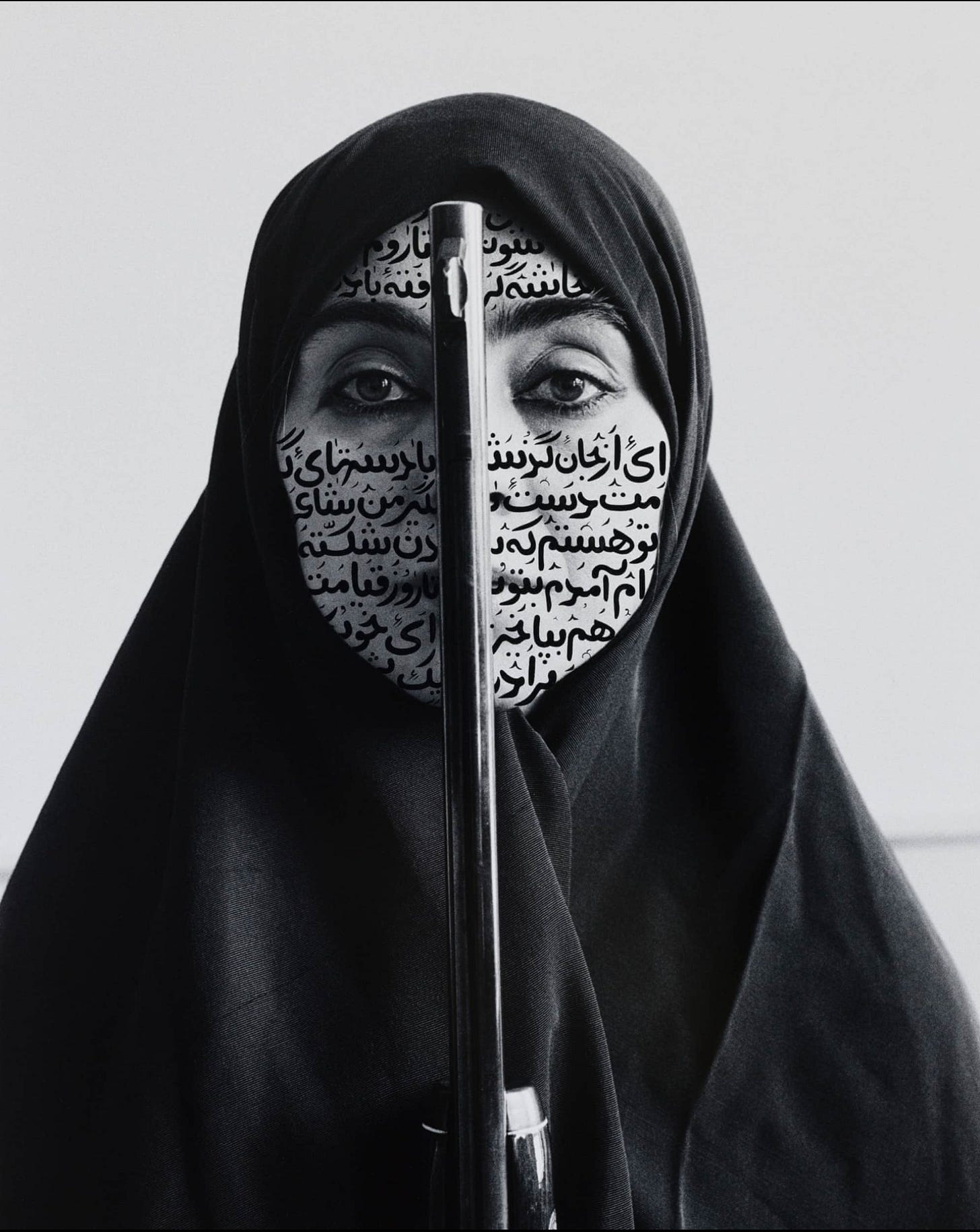Artists Should Be Leading Not Following
Iranian-American artist Shirin Neshat's advice to the young

In Wednesday’s post this week I mentioned an Iranian-American artist, Shirin Neshat, who has been outspoken in the media in her support of the young people protesting against the government in Iran at the moment. I think her work is really interesting, and I wanted to talk a bit more about it today.
Neshat was born in Iran and was sent by her family to the States in the mid-70s to study, when she was 17 years old. In 1979 the Islamic Revolution happened in Iran whilst she was studying in the States, so she remained in the USA where she settled, got married and had children. When she returned to visit Iran in 1990 she was struck by the cultural and political changes in the country, particularly the requirement by law that women dress according to Islamic tradition.
This visit led Neshat to think about the issue of gender in Islamic societies. Her art is about duality, about opposites and the space between things. And about how individual lives intersect with political realities. Neshat’s early work was quite controversial. In the photographic series Women of Allah that she made in 1994 she examined the complexities of women’s identities in the changing cultural landscape of the Middle East, combining long-standing Western tropes about the Muslim world in photographs of women. The veil, the gun, Islamic text.
Neshat’s intention was to challenge viewers to think about the representations and the misconceptions about women’s power. In the photographs women are defiantly staring into the camera, there’s a fighting spirit about them. And the text is not Quranic text but rather feminist poetry written by Iranian women. The images opened up a dialogue about the role of women and their bodies, the idea of female repression, and the concept of martyrdom. The Iranian government took offence at her work and Neshat was advised not to return to her home country.
More recently she has explored the experience of being an immigrant and her feelings about not quite being American or Iranian. Her practice has shifted from photography to moving image, and she has now made three feature length films. In this video she explains more about her background and her art, including the recent film Land of Dreams (2021), which is set in small town America and explores immigrant identity:
I really enjoy listening to Neshat because she doesn’t beat around the bush. She’s refreshingly frank and straightforward and I don’t see artists speaking like that very often. In a recent podcast interview with The Art Newspaper she excoriated the Art World for not showing their support of the protestors in Iran at the moment.
And in this interview she criticises the focus on money money money in the Art World. ‘Artists have become entertainers making decorations for people’s walls’, she says. A bit harsh perhaps, but her point is that what gets seen is in the hands of the gallerists and curators and it shouldn’t be that way. Art is a powerful tool for what she calls ‘socially-conscious communication’ and artists should be leading not following. She throws out a couple of other firecrackers in this video too, and I’d love to know your thoughts on what she says and on her art.


What Shirin says about America and the 'individualistic' culture really connects with the point Glenn Ligon was making with his ME neon! Different artists same culture. As an immigrant myself I really connected with what she was saying about always finding yourself 'between' cultures and not quite fitting in anywhere. But in a way that's a great perspective for an artist - certainly for Shirin. I think her work is great, the films too. And how amazing that the 'morality police' have just been disbanded in Iran. They need to do much more of course but the women of Iran have at least a small triumph to celebrate!With regards to the commodification of art - is this inevitable in a capitalistic society, and how amazing is it that as stocks and Crypto slide south tangible art seems to have more value than ever. But what does that do to artists who are pushing forward with new ideas and explorations? Who can we rely on to find new interesting things and give it airtime? You maybe????
When I saw that photograph my initial response was that it was a critique of brainwashing about religious fanaticism. Having read what you said about it and what Neshat says about her work I can see that is completely the opposite of the artist's intention. It's interesting how Western ideas about other cultures play into our interpretation. Feel annoyed with myself.